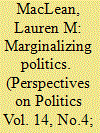|
|
|
Sort Order |
|
|
|
Items / Page
|
|
|
|
|
|
|
| Srl | Item |
| 1 |
ID:
148946


|
|
|
|
|
| Summary/Abstract |
Why did the Ghanaian state go to such extraordinary lengths to facilitate the reliable broadcast of the World Cup in 2014? During a period of frequent power outages, Ghana swapped power with regional neighbours and directed major domestic industries to reduce production in order to allow Ghanaians to watch their national soccer team compete in the World Cup. This paper investigates the politics of the public service provision of electricity in Ghana. We focus on the short-term crisis during the 2014 World Cup to reveal the citizens' and politicians' expectations about electricity as a public good. Drawing on an analysis of archival documents, Ghanaian newspapers, and interviews with government, business, and NGO officials in the energy sector, we argue that the Ghanaian state historically has created the expectation of electricity as a right of national citizenship and explore how this intersects with competitive party politics today.
|
|
|
|
|
|
|
|
|
|
|
|
|
|
|
|
| 2 |
ID:
150511


|
|
|
|
|
| Summary/Abstract |
Native Americans have been structurally excluded from the discipline of political science in the continental United States, as has Native epistemology and political issues. I analyze the reasons for these erasures and elisions, noting the combined effects of rejecting Native scholars, political issues, analysis, and texts. I describe how these arise from presumptions inherent to the disciplinary practices of U.S. political science, and suggest a set of alternative formulations that could expand our understanding of politics, including attention to other forms of law, constitutions, relationships to the environment, sovereignty, collective decision-making, U.S. history, and majoritarianism.
|
|
|
|
|
|
|
|
|
|
|
|
|
|
|
|
|
|
|
|
|